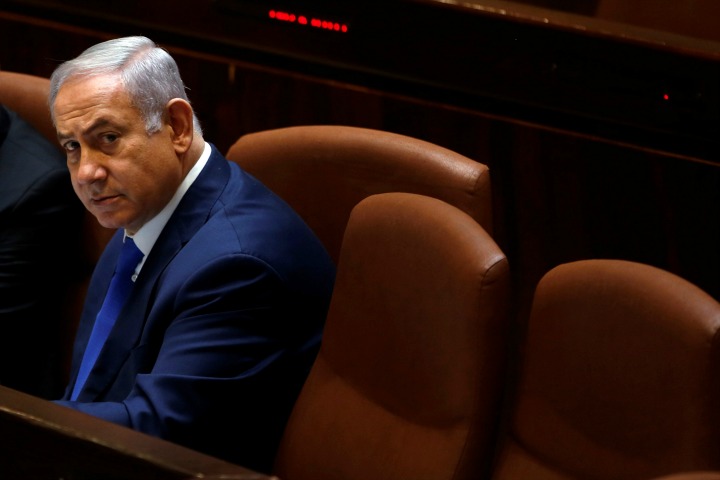Israeli Prime Minister Netanyahu Urges Feuding Coalition to Remain Intact
 by Reuters and Algemeiner Staff
by Reuters and Algemeiner Staff

Israeli Prime Minister Benjamin Netanyahu attends a Knesset session, March 12, 2018. Photo: Reuters / Ronen Zvulun.
Israeli Prime Minister Benjamin Netanyahu repeatedly urged his feuding coalition partners on Monday to remain in the government, despite speculation he was seeking its collapse and a snap election to help him survive corruption allegations.
The cabinet dispute centers on a long-standing faultline in Israeli society between those who serve in the military and those who receive a religious exemption. This has surfaced again over the framing of a bill that would extend such exemptions for ultra-Orthodox Jewish seminary students.
Opposition politicians and at least one coalition partner have suggested Netanyahu is not committed to resolving the issue and might actually prefer to let the government unravel.
An early election, political commentators said, could be used by Netanyahu to shore up public support before Israel‘s attorney-general decides whether to accept police recommendations to indict him in two graft cases.
Recent opinion polls have shown strong backing for his right-wing Likud party, even as he faces possible bribery charges in those investigations, suspicions of corruption in at least one other case, and testimony by three former aides who have turned state’s witness. Netanyahu denies any wrongdoing.
In a statement on Monday, the four-term prime minister said he wanted to keep his current six-party coalition intact.
“I call on all the coalition partners, and chief among them Defence Minister Avigdor Lieberman, to remain in the government and continue this partnership in order to ensure security, prosperity and stability for the State of Israel,” he said.
Netanyahu issued the statement minutes before Lieberman, head of the secular Yisrael Beitenu party that opposes the exemption from military service for religious students, was due to comment on a bill backed by ultra-Orthodox factions. It passed a preliminary vote in a parliamentary committee on Monday.
Later in the day Netanyahu was summoned by lawmakers to address parliament about the current crisis and reiterated that there was still time to settle any differences.
“Should there be an election, we will run and we will win. But we are not there yet. The hour is late, but not too late,” he said, above heckles from the opposition. “A supreme effort must be made, one last supreme effort in order to preserve the government in its current composition.”
The next election is not due until November 2019.
Friction
As expected, Lieberman again rejected the legislation but made clear his party, which has five of the coalition’s 66 seats in the 120-member parliament, would stay in the government for now.
“As long as it has not gone through second and third readings we will fight from within (the government). The moment it passes the second and third readings, we will draw our own conclusions,” Lieberman said of the bill.
Those votes in parliament could be months away, a time gap that could leave room for compromise.
For decades the exemption from military service on religious grounds has caused friction inIsrael, where most Jewish men and women are called up for military service when they turn 18.
The ultra-Orthodox say their study of the Torah is vital for the continued survival of the Jewish people and also fear that young men serving in the army would come into contact with women and with less pious elements in society.
Last September, Israel‘s Supreme Court gave parliament a year to pass a new conscription bill after ruling that parts of the existing exemption were unconstitutional.
 Police Stop Anti-Zionist Agitators From Accessing Florida University President’s Home as Students Revolt Nationwide
Police Stop Anti-Zionist Agitators From Accessing Florida University President’s Home as Students Revolt Nationwide Nearly One in Five Young People Sympathize With Hamas, 29% Say US Should Reduce or End Alliance With Israel: Poll
Nearly One in Five Young People Sympathize With Hamas, 29% Say US Should Reduce or End Alliance With Israel: Poll Ilhan Omar Silent After Daughter’s Arrest, Suspension for Role in Columbia University Anti-Israel Protest
Ilhan Omar Silent After Daughter’s Arrest, Suspension for Role in Columbia University Anti-Israel Protest Cultural Center Backed by Iran’s Revolutionary Guard Plans to Produce Films About Attack on Israel
Cultural Center Backed by Iran’s Revolutionary Guard Plans to Produce Films About Attack on Israel How Does Ilhan Omar Really Feel About Iran?
How Does Ilhan Omar Really Feel About Iran? This Passover, Combine Respect for Tradition with the Courage to Innovate
This Passover, Combine Respect for Tradition with the Courage to Innovate Israel’s Iran Attack Carefully Calibrated After Internal Splits, US Pressure
Israel’s Iran Attack Carefully Calibrated After Internal Splits, US Pressure Palestinian Cameramen Exposed in New Footage Documenting Oct. 7 Atrocities Side by Side with Terrorists
Palestinian Cameramen Exposed in New Footage Documenting Oct. 7 Atrocities Side by Side with Terrorists US Money to Convicted Terrorists; US Training to Aspiring Terrorists
US Money to Convicted Terrorists; US Training to Aspiring Terrorists Man Arrested in Paris After Iran Consulate Incident
Man Arrested in Paris After Iran Consulate Incident



 Palestinian Cameramen Exposed in New Footage Documenting Oct. 7 Atrocities Side by Side with Terrorists
Palestinian Cameramen Exposed in New Footage Documenting Oct. 7 Atrocities Side by Side with Terrorists How Does Ilhan Omar Really Feel About Iran?
How Does Ilhan Omar Really Feel About Iran? Amazon Pulls Book by Hamas Leader Yahya Sinwar Referencing Oct. 7 Attacks After UK Lawyers Intervene
Amazon Pulls Book by Hamas Leader Yahya Sinwar Referencing Oct. 7 Attacks After UK Lawyers Intervene Tehran Signals No Retaliation Against Israel After Drones Attack Iran
Tehran Signals No Retaliation Against Israel After Drones Attack Iran Ilhan Omar Silent After Daughter’s Arrest, Suspension for Role in Columbia University Anti-Israel Protest
Ilhan Omar Silent After Daughter’s Arrest, Suspension for Role in Columbia University Anti-Israel Protest